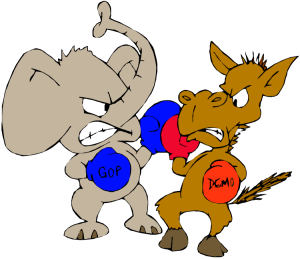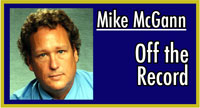Summer of discontent has voters asking ‘what’s going on here?’
By Mike McGann, Editor, UnionvilleTimes.com
 Welcome to the summer of economic insanity.
Welcome to the summer of economic insanity.
More than likely, you’ve heard about the madness in D.C. on the debt ceiling and it has more than a few of us scratching our heads, being more about political theater than good governance.
But…leave it to Gov. Tom Corbett to raise the stakes of politicians talking about money and taxes and sounding more than a little like they’ve been repeatedly whacked in the forehead with a 2 x 4.
Gov. Tom explained last week this that layoffs at various school districts around the state aren’t because of the hundreds of millions that got slashed from the state funding, nope, it was that evil, evil stimulus money being taken away. He then blamed the school districts for needing layoffs.
 Is that true? Well…not exactly. Sure, in some districts, such as Unionville, the cuts in state aid is about the same as what the stimulus funds were. Oh, and there were still layoffs, more caused by drops in local tax revenue than anything else.
Is that true? Well…not exactly. Sure, in some districts, such as Unionville, the cuts in state aid is about the same as what the stimulus funds were. Oh, and there were still layoffs, more caused by drops in local tax revenue than anything else.
But, drive a few hundred feet down Route 82 and suddenly, the governor’s math doesn’t hold up so well. The Kennett Consolidated School District pretty much assumed that $400,000 in stimulus money was going away when it planned its 2011-12 budget. The extra million bucks in cuts — above and beyond the numbers from the stimulus? Not so much. That’s a pattern repeated at a number of districts around Chester County.
Look, I get that tough choices were made. I agree completely that the state budget needed to be less than $27.3 billion and it made sense not to spend the ephemeral $500 to $700 million in alleged surplus in state tax receipts — let’s see the number after a year and err on the side of caution for once. I might have even have made some of the same cuts (to be sure, I would have made a lot of different ones, too, sparing education as much as possible, as it directly impacts local tax rates — not mention the whole thing about hurting the kids and weakening the state’s ability to compete).
But the governor and the state legislature can’t and shouldn’t run away from their choices here.
To be honest, here. Gov. Tom needs to man up and take ownership of this. If the cuts were the right thing to do, be a grown up and stand behind them, don’t go right to the “same-old, same-old” Harrisburg playbook and try to shove the blame off on someone else. If the governor can’t say, “look, I know these cuts hurt — but we had to take dramatic action to balance the budget. We know there’s pain, but we’re trying to make sure it’s shared as fairly as possible” then what does that say about his conviction that the decisions made were the right ones?
As for the posturing in D.C., while both sides seem more interested in scoring political points than solving problems, one name keeps popping up: Grover Nordquist.
It seems a lot of members of Congress have signed ol’ Grover’s pledge not to raise taxes, ever. It’s kind of interesting to me that these members seem to take this pledge more seriously than their oath of office.
Maybe it’s a rhetorical question, but what if the United States were invaded and we needed to mobilize a giant military effort immediately? Clearly, that wouldn’t be possible without raising taxes and revenue — so which promise is to be kept?
Each member of Congress took this oath when taking office:
I do solemnly swear (or affirm) that I will support and defend the Constitution of the United States against all enemies, foreign and domestic; that I will bear true faith and allegiance to the same; that I take this obligation freely, without any mental reservation or purpose of evasion; and that I will well and faithfully discharge the duties of the office on which I am about to enter: So help me God.
If the obvious answer is that said member would vote to raise taxes to preserve the republic in time of war, then where is the “line in the sand?” Would it be economic collapse and becoming a wholly-owned subsidiary of the Chinese?
I’m not sure what the right answer is, but I’d love to hear the question put to those who taken the pledge.
It also seems a little odd to me that I paid more in taxes than General Electric, News Corp. or any number of multinational corporations did — and while we’re doing okay, The Times didn’t generate anything like $4 billion in profits. Does the pledge mean maintaining a tax structure that seems, well, kind of unAmerican?
Of course, I have some of the same issues with those on the left who refuse to consider cuts to Social Security, Medicaid and Medicare. These are tough times and combined with changing demographics, we need to be able to take a hard look at changes to these entitlement programs — their cost is outgrowing the rate of inflation and, along with defense spending, could eventually crowd out all other federal spending. If that means raising eligibility ages and some benefit trims, so be it.
But it seems like neither side wants to talk, make a deal or get things moving.
When there’s no option to negotiate, what’s the point of having elected officials? Have we reached a point where the two major political parties have rendered themselves useless?
Makes you think, right?
Column: the fundamentals of economic failure
Summer of discontent has voters asking ‘what’s going on here?’
By Mike McGann, Editor, UnionvilleTimes.com
More than likely, you’ve heard about the madness in D.C. on the debt ceiling and it has more than a few of us scratching our heads, being more about political theater than good governance.
But…leave it to Gov. Tom Corbett to raise the stakes of politicians talking about money and taxes and sounding more than a little like they’ve been repeatedly whacked in the forehead with a 2 x 4.
Gov. Tom explained last week this that layoffs at various school districts around the state aren’t because of the hundreds of millions that got slashed from the state funding, nope, it was that evil, evil stimulus money being taken away. He then blamed the school districts for needing layoffs.
But, drive a few hundred feet down Route 82 and suddenly, the governor’s math doesn’t hold up so well. The Kennett Consolidated School District pretty much assumed that $400,000 in stimulus money was going away when it planned its 2011-12 budget. The extra million bucks in cuts — above and beyond the numbers from the stimulus? Not so much. That’s a pattern repeated at a number of districts around Chester County.
Look, I get that tough choices were made. I agree completely that the state budget needed to be less than $27.3 billion and it made sense not to spend the ephemeral $500 to $700 million in alleged surplus in state tax receipts — let’s see the number after a year and err on the side of caution for once. I might have even have made some of the same cuts (to be sure, I would have made a lot of different ones, too, sparing education as much as possible, as it directly impacts local tax rates — not mention the whole thing about hurting the kids and weakening the state’s ability to compete).
But the governor and the state legislature can’t and shouldn’t run away from their choices here.
To be honest, here. Gov. Tom needs to man up and take ownership of this. If the cuts were the right thing to do, be a grown up and stand behind them, don’t go right to the “same-old, same-old” Harrisburg playbook and try to shove the blame off on someone else. If the governor can’t say, “look, I know these cuts hurt — but we had to take dramatic action to balance the budget. We know there’s pain, but we’re trying to make sure it’s shared as fairly as possible” then what does that say about his conviction that the decisions made were the right ones?
As for the posturing in D.C., while both sides seem more interested in scoring political points than solving problems, one name keeps popping up: Grover Nordquist.
It seems a lot of members of Congress have signed ol’ Grover’s pledge not to raise taxes, ever. It’s kind of interesting to me that these members seem to take this pledge more seriously than their oath of office.
Maybe it’s a rhetorical question, but what if the United States were invaded and we needed to mobilize a giant military effort immediately? Clearly, that wouldn’t be possible without raising taxes and revenue — so which promise is to be kept?
Each member of Congress took this oath when taking office:
If the obvious answer is that said member would vote to raise taxes to preserve the republic in time of war, then where is the “line in the sand?” Would it be economic collapse and becoming a wholly-owned subsidiary of the Chinese?
I’m not sure what the right answer is, but I’d love to hear the question put to those who taken the pledge.
It also seems a little odd to me that I paid more in taxes than General Electric, News Corp. or any number of multinational corporations did — and while we’re doing okay, The Times didn’t generate anything like $4 billion in profits. Does the pledge mean maintaining a tax structure that seems, well, kind of unAmerican?
Of course, I have some of the same issues with those on the left who refuse to consider cuts to Social Security, Medicaid and Medicare. These are tough times and combined with changing demographics, we need to be able to take a hard look at changes to these entitlement programs — their cost is outgrowing the rate of inflation and, along with defense spending, could eventually crowd out all other federal spending. If that means raising eligibility ages and some benefit trims, so be it.
But it seems like neither side wants to talk, make a deal or get things moving.
When there’s no option to negotiate, what’s the point of having elected officials? Have we reached a point where the two major political parties have rendered themselves useless?
Makes you think, right?
Share this post:
Related Posts
Smart ways to use your tax refund
Letter: Our legislators need to get back to work:
It’s not about ‘parental rights,’ it’s about greed